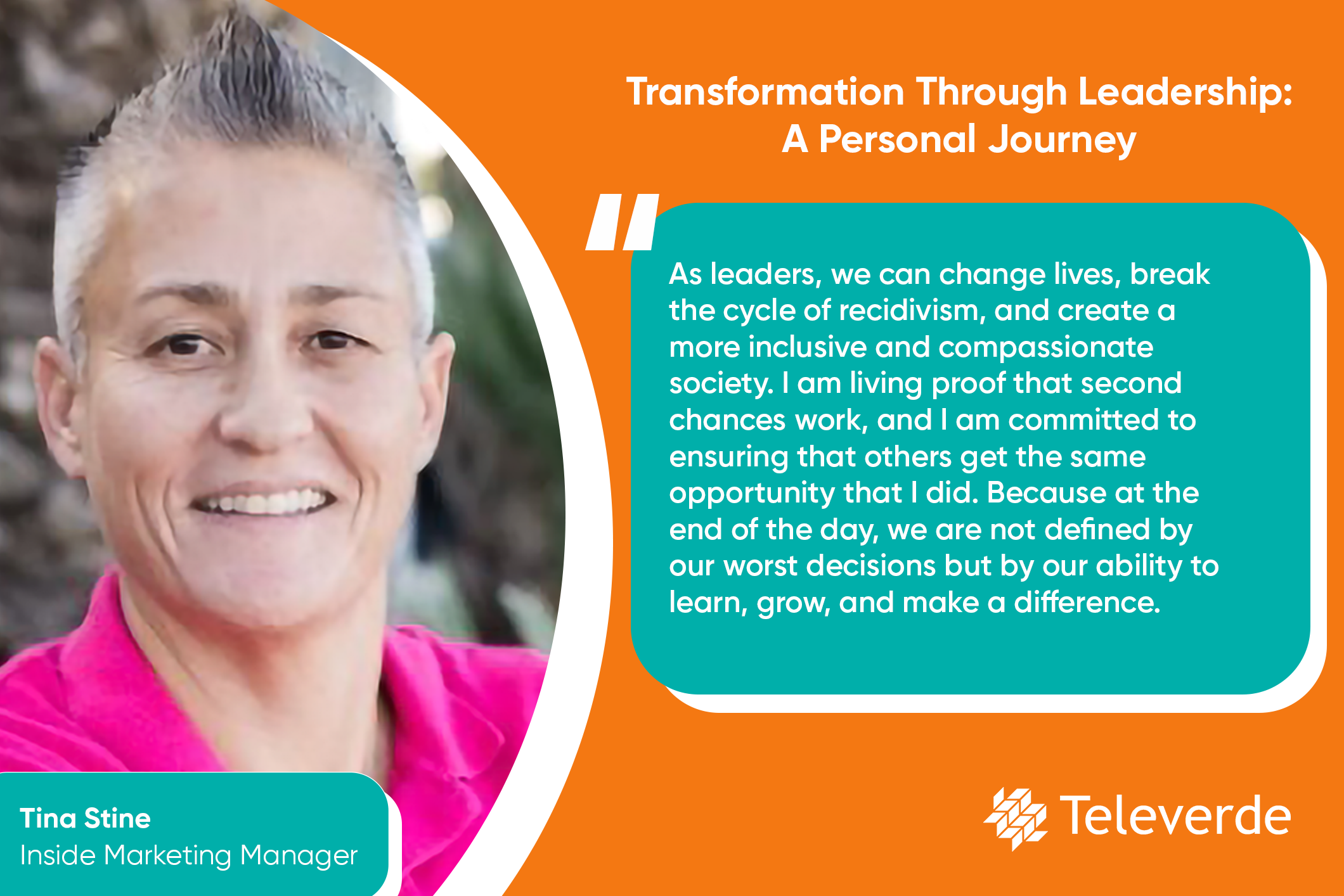Transformation Through Leadership: A Personal Journey
How would you feel if your manager had a criminal record? Would you question their ability to lead? Would you think differently of them? Now, let’s reverse the roles. As a manager, would you hire someone with a felony conviction on their record? Would you feel that a formerly incarcerated employee was inherently less skilled or less trustworthy because of their past? These are tough questions that challenge our perceptions and biases. They force us to confront the stigma associated with incarceration and the barriers it creates in the workplace. As someone on both sides of this issue, I can tell you that the answers are not as straightforward as they might seem.
Luckily for me, it’s been at a company and in an environment where I’ve been accepted with open arms by people who saw potential in me that, at the time, I couldn’t see in myself. I spent many years of my life making poor choices and doing things I would go on to regret. Eventually, my actions led me to become incarcerated, and I spent too many years of my life behind prison bars. In 2002, a future colleague slid a job application across the table to me. She told me I needed to stop making prison an option and to apply for a job at Televerde, a sales and marketing solutions company that would become my second chance. That conversation was a turning point in my life. Then, in 2015, a former colleague asked if I would be interested in coming back to Televerde for a new opportunity. I jumped at the chance and I’m still working for the company today as an inside marketing manager, leading a team that serves one of our largest clients with a team of mostly second-chance hires.
I now have a dream job with an employer that recognizes my value, and I work with colleagues who trust and support me every day. I’ve learned a ton about what it means to be a leader from my own experiences and the lessons from the leaders who mentored me. I want to share some of the most important ways my experiences have shaped my leadership style and helped me transform my life.
Seeing the Human First
Throughout my career, I’ve learned the importance of human-first leadership. People are more than mere data points; they possess unique abilities that, when nurtured, lead to success. As a manager, I prioritize building trust, providing mentorship, and celebrating wins.
In practice, human-first leadership starts with learning the strengths and weaknesses of my team and putting opportunities in front of them where they are the most likely to be successful. I’m building a team that can consistently meet goals and perform, is willing to learn and improve, and continually works to the best of their unique abilities. Skills can be taught, but coachability, work ethic, and enthusiasm are harder to find.
Investing in people personally and professionally is an incredible value; I know that because others have done so for me. I am in the position I am today because other leaders saw my potential and invested time and resources into helping me reach it. To them, I wasn’t just a felon. My life is better today because they looked past the labels and put me, the human, first.
Everyone Is Unique
As a new manager, I struggled with wanting everyone to do things my way. I knew how to manage my book of business, my approach to the job, and the standards and expectations to which I held myself. I quickly realized there wasn’t one right way to do the job. Everyone has different skill sets, personal and professional goals, and challenges to overcome.
Many of the women on my team have been incarcerated, and some are still transitioning back to life outside of prison. They face challenges that others won’t have to deal with, and having been in their shoes myself, I know how difficult it can be. I am here to help them navigate these challenges in a way that allows them to be accountable for their goals. I think focusing on results is more valuable than how people do their work. I look at the data as a manager to judge how my team is doing. If someone is falling behind, I work with them to help make the necessary improvements. Ultimately, my job is to ensure they have what they need to succeed.
When I was still an inside marketing representative in the call center, I was made to feel that my input was valued. Even while incarcerated, I was allowed to expand my skill set and try new things. I was treated as an individual, and aim to do that for everyone on my team.
Nobody Is Great on Their Own
When I first started as an inside marketing manager, I was nervous. I wasn’t sure I was up to the task and wasn’t entirely comfortable supervising people I had previously been sitting shoulder-to-shoulder with. However, I was able to lean on other, more established leaders in the company. I asked questions, asked for help when I needed it, and watched how they would handle situations I had difficulty navigating on my own. They served as the pillars of my success as a leader.
My journey with Televerde showed me how important it is to be able to lean on others, personally and professionally. I worked hard and put in massive amounts of personal effort to get to where I am today, and I’m proud of that. However, with the support of my colleagues and mentors, I am better at my job than I ever could have been on my own.
Second Chances Change Lives
We are so accepting and forgiving of those in our circles. How many second chances have you given to a family member? To a friend? As you read this, I’m sure you’ll remember the second chances you have given. Why should companies be any different?
Companies are built and run by humans who have been given second chances their whole lives. The late Jim Hooker figured that out long ago, and from that idea, Televerde was born. Nearly 30 years ago, he saw what many leaders are just starting to see – that people can’t be reduced to a label and are more significant than their mistakes. I know that I am not the total of my worst decisions. Nobody is. And I am honored to be a part of his legacy, paying it forward by providing more second-chance opportunities.
Managers and corporate leaders focus on optics, performance metrics, and credentials when hiring. Second-chance workers may not seem like the best candidates based on conventional metrics, but other factors influence someone being a great employee. Those given a second chance are incredibly loyal, hardworking, and eager to prove themselves. We know what is at stake, and I would not be the person I am today if not for a second chance.
My journey from incarceration to leadership at Televerde has taught me invaluable lessons about the power of second chances, the importance of human-first leadership, and the transformative potential of investing in people. The opportunity to lead and mentor a team of second-chance hires is not just a job; it’s a testament to the power of redemption and the potential for transformation. It’s proof that labels do not define us and that our past mistakes do not dictate our future. As leaders, we can change lives, break the cycle of recidivism, and create a more inclusive and compassionate society. I am living proof that second chances work, and I am committed to ensuring that others get the same opportunity that I
did. Because at the end of the day, we are not defined by our worst decisions but by our ability to learn, grow, and make a difference.


